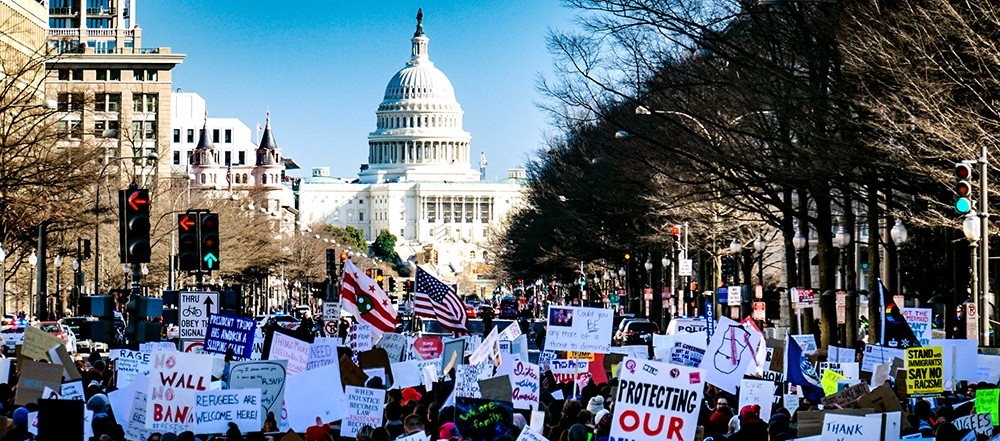Activists rally in Washington, D.C. on Feb. 4, 2017, in protest of President Donald Trump's executive order halting all refugee
admissions and temporarily barring people from seven Muslim-majority countries (Photo: Ted Eytan/flickr/cc)
Latest Magazine
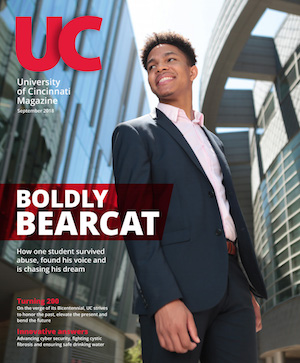 September 2018
September 2018
Boldly Bearcat
Finding his voice
Danger in the tap
Virtual defense
Global game changer
Celebrating UC's Bicentennial
 Past Issues
Past Issues
Browse our archive of UC Magazine past issues.
UC professor tackles ‘Muslims, Identity, and American Politics’ in new book
UC political scientist Brian Calfano’s sweeping study details why American Muslims feel a sense of identity attachment to the U.S. as their home even as they continue to face government scrutiny and social segregation.
by Rachel Richardson
513-556-5219
April 25, 2018
Muslims are the fastest-growing religious group in the world, according to a report issued last year by the Pew Research Center. And in the U.S., the center projects Muslims will comprise 2.1 percent of the U.S. population by 2050, surpassing Jews as the second-largest faith group in the country.
Yet American Muslims continue to face suspicion, government scrutiny and social segregation in the U.S. despite significant education and economic assimilation, says Brian Calfano, an assistant professor of political science and journalism in the McMicken College of Arts and Sciences at the University of Cincinnati.
Calfano, also a seasoned political reporter and former policy advisor, details the socio-political minefield and continued backlash American Muslims navigate in his new book, “Muslims, Identity, and American Politics.”
The book, released April 16 by Routledge, examines the pressures, both personal and political, faced by Muslims in Western nations, especially the U.S., where they are often ostracized as political and social outsiders. Special attention is paid to the role of Muslim identity formation, as American Muslims, many of them citizens and second-generation, struggle to move beyond the stereotype of suspicious interloper to become fully engaged political participants in their home country.
Calfano’s sweeping study is his third book. He is the co-author of “God Talk: Experimenting with the Religious Causes of Public Opinion” (Temple University Press, 2013) and “A Matter of Discretion: The Politics of Catholic Priests in the United States and Ireland” (Rowman and Littlefield, 2016).
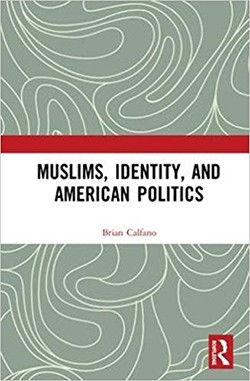
Calfano, who conducts research on marginalized groups, political information use, religion and politics, and journalistic coverage of political events, has also published 40 peer-reviewed articles in a range of scholarly journals.
UC Magazine caught up with Calfano to discuss his new book, what motivated him to write it and what the work has to say about the experiences of American Muslims in a country that views them with suspicion.
What is ‘Muslims, Identity, and American Politics’ about?
The book examines the facets of Muslim identity in American society post-9/11. Its core question is whether and why Muslims feel a sense of identity attachment to the U.S. as their home. The answer is that Muslims do feel this attachment, but why is more complicated. Much of the reason comes down to influence from both Muslim and non-Muslim identity groups, or, more precisely, the perceived expectations that Muslims have of these groups exerts influence on their sense of belonging and behavior.
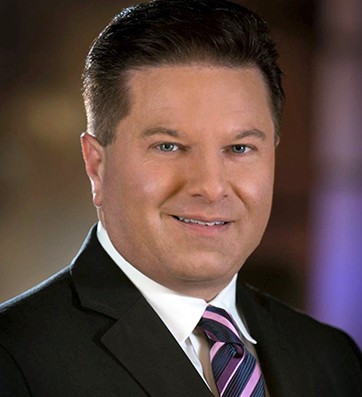
What led you to write it?
Perhaps the biggest reason is that I was concerned that the nuance of Muslim identity was being lost in the larger political context where policy debates occur. On one hand, you have the stereotypes of Muslims as terrorists or disloyal to the U.S. Academics do a good job of pushing back on these gross mischaracterizations, but the takeaway from these efforts sometimes ends up being reduced to another cliché, namely that Muslims in America are all flag-flying patriots who are the targets of Fox News and talk radio pundits.
In reality, real life and real people are far more complicated than either stereotype. As part of my analysis, I show a clear preference among Muslims living in the U.S. to not be known for their religious identity, at least not primarily or entirely. Instead, and like just about everyone else in the world, Muslims would like to live out an existence in service to other senses of being (like, their career, parental role, even hobbies). If I were writing a popular press type of book on the subject, I'd be tempted to title it "Muslims are people too."
Moving beyond the stereotypes, how politically engaged are American Muslims?
There is certainly a strong motive among Muslims in the U.S. to engage in the political sphere, but, unlike some of the reductionist characterizations of them, Muslims are neither disinterested nor the most engaged in political life. In fact, one intriguing finding from my analysis is that the kinds of identity labels that we use to ask Muslims about themselves (specifically, "Do you consider yourself Muslim or American?") may actually depress self-reported political behavior because it signals a willingness by the questioner to put Muslims into limited identity “boxes” that really do not reflect the reality of their lives and senses of being.
Why is this book and subject timely now?
I think it’s timely because the book makes readers look beyond the clichés about Muslims in the U.S. — both the negative and positive ones — and encourages readers to truly see Muslims as regular people who are asked to deal with an extraordinary set of social and political pressures in the post-9/11 world.
What contribution will your book make to the larger debate and conversation on Muslim identity and American politics?
My hope is that the book advances insight into questions of what it means for people who have their identity characterized by both internal and external forces to make self-determined choices about how they want the world to see them.
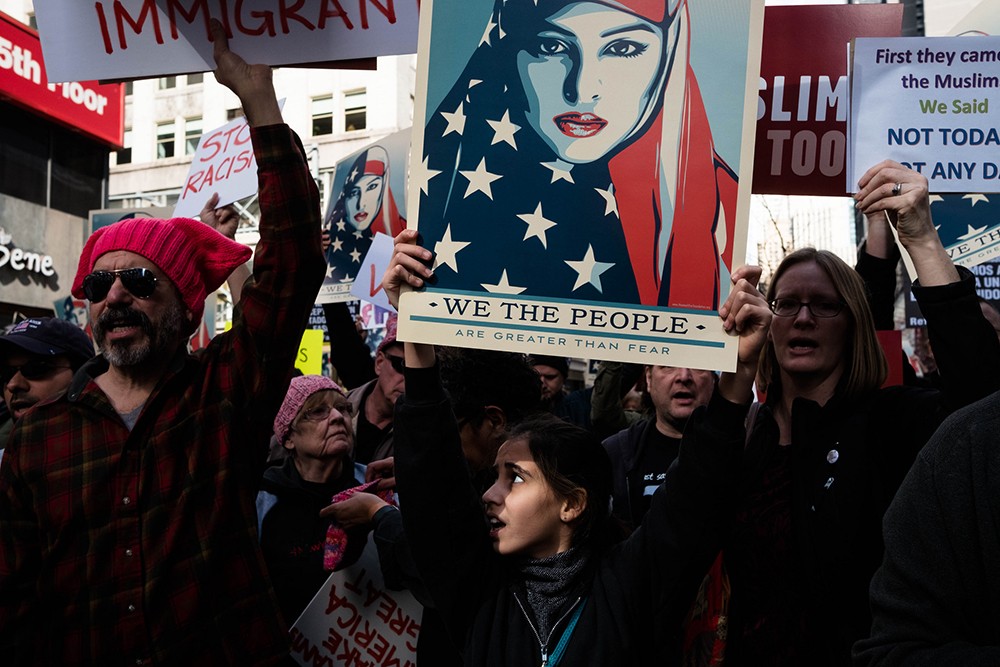
Thousands of New Yorkers converged on Times Square Feb. 19, 2017, to denounce what they see as threats and pressure aimed at Muslim communities. (Photo: B.C. Lorio/flickr/cc)
About the book
Calfano provides an examination of the pressures faced by Muslims, often considered political and social outsiders in western nations, especially in the United States. Identity is a complex concept, especially when considering the role that group attachments play in affecting how one sees her/his role in the political environment of their country of residence. Perhaps the greatest tension in this regard is felt by those who are often considered outsiders in their home country, despite significant ties to their nation.
Though citizens and second generation residents in many cases, American Muslims face a combination of suspicion, government scrutiny, and social segregation in the United States, despite significant education and economic assimilation in America. The crux of the investigation advanced here centres on how group influence, emotions, and religious interpretation contribute to the political orientation and behaviour of a national sample of Muslims living in the American context.
A compelling explanation as to how members of an ostracized political group marshal the motivation to push through suspicion to become fully engaged political actors, this book has wide relevance and will be of interest to scholars researching Muslims and political participation across the fields of political science, history, sociology, and religion.
What critics are saying
"Calfano’s study provides a thoughtful and nuanced picture of Muslim experiences in the United States. This is a timely contribution to our understanding of Muslim identity formation, with important implications for political attitudes and behavior. An essential read for scholars in the field as well as everyday Americans looking for insight on this understudied community." - Rachel Gillum, Stanford University, USA.
"Much of our understanding about Islam in the US has come from elites and the media. Calfano’s well-written and conceptually sophisticated volume provides us with a better understanding of the consequences that the present-day backlash is having on Muslim Americans. Calfano has produced a masterful and must-read book for religion and politics scholars by refocusing the lens on the experiences of Muslim Americans and providing an examination of their responses to the sociopolitical pressures they face today." - Nazita Lajevardi, Michigan State University, USA
Become a Bearcat
Learn more about UC's undergraduate, graduate and certificate programs in the departments of Political Science and Journalism or explore the university's many other degrees and programs. Tour the campus and apply today.

